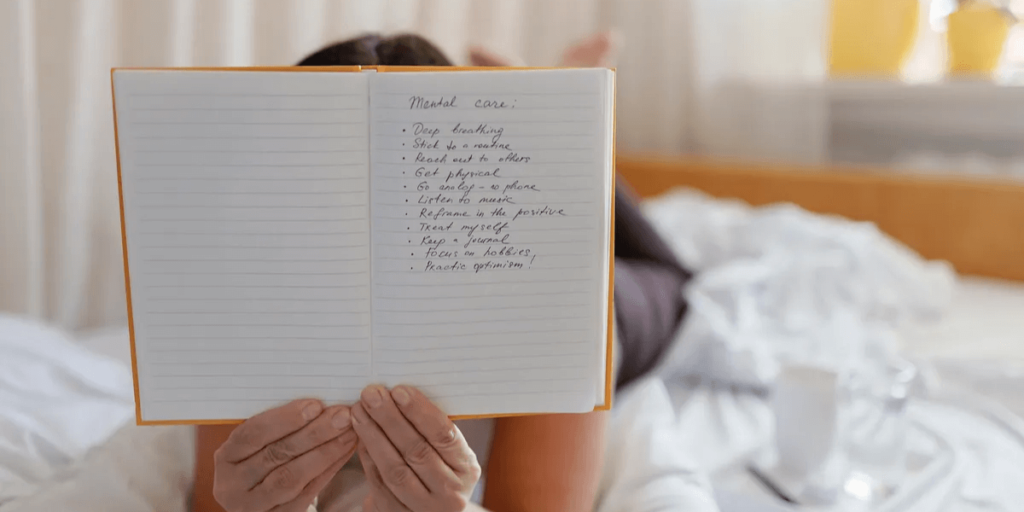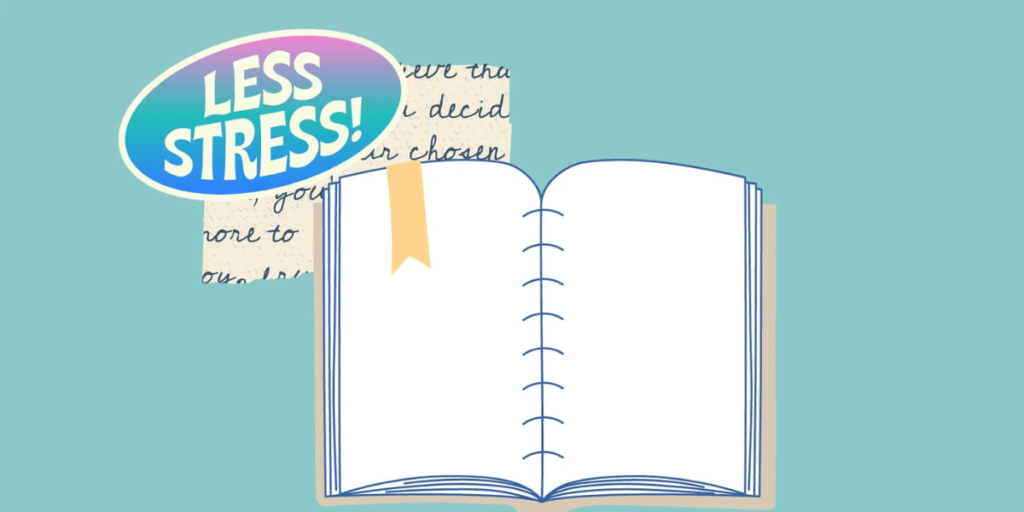In today’s world where we are excessively bombarded with other’s thoughts and ideas, there is no time for our thoughts. Consumerism attacks individuals for a need for external validation and escapism from deeper emotional issues or existential questions. It mostly surrounds statuses on what you own rather than what you are.
Have you ever felt like your mind is a whirlwind of thoughts, emotions, and to-do lists leaving you overwhelmed and distracted? Maybe it is time for you to start looking inside and at your thoughts, listening to what you have to say. And you can do this by Journaling. The primary reason to write Is to communicate with others or provide information. Writing a journal means communicating with yourself.
Throughout history, we see philosophers such as Marcus Aurelius keeping a journal without any intention to publish it which was later published as a book Meditations.
As the quote from the famous Psychologist goes-
“Who looks outside, dreams; who looks inside, awakes.”
Carl Jung
Here are some insights into how Journaling can help improve your Mental Health and How to Journal.
Table of Contents
The Impact of Journaling on Mental Health

Journaling is more than just writing and keeping a record of your life events. It is more like analyzing, discovering deep thoughts, and the causes of your actions, keeping track of certain patterns, and looking back at them to improvise. By doing so, Journaling can have many benefits to our lives. Below are some.
Learn more here about Digital Detox.
Clarity in Vision
Sometimes we may not have a friend, a relative, or a guardian to turn to in case of any need of advice or guardian or if we find ourselves in a difficult situation. Journaling provides a safe space where one can express and introspect. By putting down thoughts, emotions, and aspirations one can gain clarity and self-awareness. With clarity in our vision, we can face challenges with better understanding and purpose.
Healing Emotions
A study conducted by Cambridge University Press suggests writing about stress, negative emotions, and traumatic experiences has been found to result in better physical and psychological health. It is not always pleasant to express our negative emotions such as our deepest fear, anger, shame, and unresolved issues to someone and sometimes this stays suppressed inside us making us even more difficult to function.
Journaling serves as a therapy for our emotions. We have a safe space to express negative emotions, grief, anxiety, and stress. By acknowledging and validating these emotions we learn self-compassion over time leads us to become more resilient.
Keeping Accountability
It is easier to stay distracted than to stay focused and responsible. Sometimes being busy is being out of control. The art is to find the perfect balance within to stay more responsible to achieve our goals.
Documenting our goals, aspirations, and action plan cultivates a sense of accountability. Writing it down compels us to be more action-oriented. By journaling regularly, we can keep track of our progress toward each goal we set and eventually fulfill them.
Reducing Stress

According to research done by the National Library of Medicine, Expressive writing appears to be effective in reducing stress and optimizing communication between therapists and families.
After the earlier study, a follow-up study showed a result within participants 12 to 18 months of practicing writing exercises to have a practical positive impact among a maximum of the participants.
Better Health and Wellbeing
Besides having many proven benefits. Journaling has a better impact on physical health and mental well-being. An example of research comes from the American Psychological Association (APA), the study examined a form of journaling, where individuals write about their deepest thoughts reported to sustain improvement in mood and physical symptoms over time.
Getting Started with Journaling
It can be quite scary to look at a blank piece of paper when you are just bombarded with loads of thoughts and emotions. You can start journaling with the right method that suits you and your style. Here are some tips that will help you jot down effectively your thoughts and aspirations.
- Setting Goal
Before you start writing, it is important to find out the goal of keeping a journal for you. Is it to heal from your emotional wound, is it to keep track of your journey or is it for better stress management? By clarifying the goal, you set you can promptly choose the times when you want to write and how often will you be writing.
Find more tips for setting journaling goals.
- Choosing your medium

There are many ways to journal. Some like to keep it digitally and some opt for a physical journal book. We recommend keeping a physical journal as it gives you more isolated space for a better thought process and introspection. Keeping a digital journal always comes in handy despite the situation and place while not missing out on sudden ideas and to-do lists.
Find more on choosing the right medium that suits your preference.
- Designated Environment for Journaling
Your journaling space is where you will be talking to your inner self. This place should be out of distractions and peaceful enough to create a safe environment for you to open up. You may opt for a cozy corner or a quiet café per your preference where you feel most comfortable expressing yourself and being mindful.
Choose Your Journaling Format
Many formats are used when writing a journal. You can choose any from the below-suggested. There is no rule to choose only one format. Depending on your mood and state of mental health you can choose one or more methods to journal.
- Deloading and Decluttering
This is the best format that can be approached if you often deal with stressful and anxiety-filled situations. In this way, the writer can pour down any thoughts or emotions that they feel without caring about grammatical or punctuation errors. Deloading is good for emotional release and focus. When you want to rant or be more aware of the kind of thought you might be dealing with you can try decluttering method of journaling.
- Questioning Yourself
If you are on a quest for self-discovery or want to become more self-aware, you can try this method. This method works simply by asking yourself questions. For example, you are not feeling well so you ask “Why am I not feeling well?” and more questions that point to the origins. It is always recommended to end this approach by asking questions like “What are three good things that happened to me?” or “What are you grateful for today?” Asking these questions at the end will refrain you from going down the never-ending why spiral.
- Conversational
A conversational approach is simply conversing with yourself. Journaling can put you on a road filled with self-loathing attitudes, and pity especially when dealing with negative emotions. By approaching the Conversational method, you are not only expressing yourself but also listening to yourself. It is like being your own best friend. You become more compassionate and develop self-love while journaling.
- Lay out the Maps
This type of approach is good for Planning, Decision making, brainstorming, and exploring the creative potential in yourself. By writing certain goals and plans that keep you accountable you become more disciplined. It also helps you play with the creative side of yours. Lay out the Map makes you a problem solver by exploring types of solutions and trying them out in real life.
Keep a Journal Routine
Although Journaling is appealing and beneficial. We often get lost in the way and eventually lose touch with our interaction with the journal. By keeping a healthy routine for Journaling like for any other task we can build it into a unbreakable habit for the best of us.
- Start small
When you are a beginner or an individual tapping into this process after a long time, it can be challenging to write effortlessly when dealing with the perfectionist inside of you. You can start small by just writing daily affirmations and any thoughts you may have that you feel are boring.
A Study from 2018 shows, that just 15 minutes of writing positive affirmative journaling may help improve stress, and anxiety and boost resilience.
- Keep it Simple and Easy
You do not have to write like a narrator or a novelist. A journal can be as simple as a few sentences, bullet points, or pictures. You can start with a digital note that comes in handy and is easy to access daily.
You can also download the Day One App to put yourself into the habit of daily writing.
- Use Prompts to Guide you
Journal prompts are pre-designed layouts and questions used to organize your journal entries. Using these templates can be helpful and easy for those with difficulty knowing where to start when journaling.
The Day One Journal app has several built-in templates and formats that make it easier for individuals to follow through a structured way of journaling.
- Track your Progress
It is important to set out a day out of the week when you track your progress. The day can be once a week or a month depending on how soon you want to see progress.
- Get Creative

Aside from documenting your thoughts goals and ideas, Journaling can be much more fun. You can keep it more creative by writing your dreams, adding pictures that you want to remember, adding quotes that you like and there are many ways to keep it creative and entertaining. The more fun it is the more easily it becomes a habit.
Conclusion
Journaling has a range of benefits. Just writing for a few minutes a day may help you better deal with your state of mental health. Many researches have shown that Journaling fosters clarity, heals emotions, and enhances overall well-being.
By implementing simple techniques, you can make journaling a part of your daily life. Journaling can introduce you to your painful memories, undiscovered thoughts, and a part of yourself filled with potential that you probably have not discovered yet. The goal is to find you and unleash your potential. There is no right or wrong way to journal. Make it your own.
Frequently Asked Questions
When is the right time to write a journal?
There is no right or wrong time to journal. In any overwhelming situation, you may want to jot down your thoughts for better clarity. It is recommended to set a designated time to journal every day to keep it a healthy habit.
Can Journaling improve my writing skills?
Yes, Journaling can improve your writing skills. A consistent habit of writing can be great for practicing writing eventually leading to adapting to better writing practices such as grammar, punctuation, and expanding vocabulary.
What Should I write about in my journal?
There are many things you can write about in your journal. You can write about your emotional experiences, thoughts, goals, aspirations, stories, and track progress. Journaling is your personal space that helps you lead your life better by documenting the good and bad things about it.
Can Journaling help me become more self-aware?
Yes, the goal of journaling is delving deep within one’s self. By doing so you can discover patterns, habits, and behaviors that you may not have noticed otherwise. Journaling can be a powerful tool for personal development and self-discovery.
How Journaling can help me manage stress?
The most common reason for stress often is overthinking. Journaling provides a safe space to express your negative emotions, thoughts, or anything that bothers you. By identifying these stressors through journaling, you can come up with better coping strategies to manage stress. Journaling is a form of expression in itself and it can help you release any negativity.
